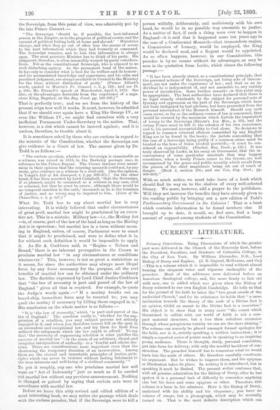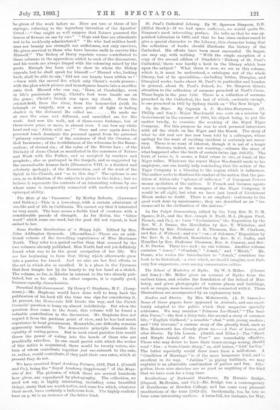CURRENT LITERATURE.
Primary Convictions. Being Discussions of which the greater part were delivered in the Church of the Heavenly Rest, before the President, Faculties, and Students of Columbia College, in the City of New York. By William Alexander, D.D., Lord Bishop of Derry and Raphoe. (J. R. Osgood, llicIlvaine, and Co.) —This is a volume which it is impossible to read without almost hearing the eloquent voice and vigorous onslaughts of the Preacher. Most of the addresses were delivered before an American theological college, and, the more firmly to link old with new, one is added which was given when the Bishop of Derry returned to our own English Cambridge. He tells us that the ground of his faith he takes the "two great creeds of the undivided Church," and for its substance he holds that "a. mere inclination towards the theory of the mode of a Divine fact is. an opinion, whilst an assent to the Divine fact is a conviction?' His object is to show that in many cases "the comet which threatened to collide with our world of faith is not a com- pact material structure, but a less than nebulous extension through whose perspicuous tenuity we can see the stars shining." The volume can scarcely be placed amongst formal apologies for the faith, nor is it, strictly speaking, a written instruction ; it is simply a reported series of points made in speaking to an inspiring young audience. There is thought, study, personal conviction, put into form for delivery, with only the needful backbone of con- struction. The preacher himself has to remember what he would barn into the souls of others. He therefore carefully constructs his argument. But he wishes to impress them, and the epigram or illustration takes its place. In writing it is introduced, but in speaking it must be flashed. The present writer confesses that, with all genuine admiration for the Bishop of Derry, after he has spoken it is a personal task of difficulty to remember anything else but his force and some epigram or other. Therefore this volume is a boon to his admirers. Here is the Bishop of Derry,. enshrined with his ability and his eloquence ; you have no volume of essays, but a phonograph, which may be mentally turned on. That is the most definite description which. can
'be given of the work before us. Here are two or three of his sayings ; referring to the legendary invention of the Apostles' Creed :—" One might as well suppose that Nature gummed the
■ leaves of flowers on one by one." "Hope and fear are stimulants not to be recklessly administered." "He who had neither hard- ness nor beauty nor strength nor selfishness, not only survives, He gives survival to those who have become unfit to survive like Himself." The Bishop of Derry reprints verses contributed to -these columns in the appendices added to each of the discussions, and his words are always tinged with the colouring mixed by the poets. Enough has been said to show to whom the Bishop 'appeals, but he shall speak for himself :—" Blessed who, looking back, shall be able to say, Did not our hearts burn within us P' —burn with the sacred fire which only Christ's words possess ; with the glow which pierces and transfigures hearts into a sacrifice -unto God. Blessed who can 'say, Here, at Cambridge, even in life's passionate spring, Christ's feet were beside me on the grass ; Christ's breath was upon my cheek. Prom the cricket-field, from the river, from the honour-list (with its triumph or tragedy, now a mere point of light or fading
shadow in the distance) He called me He made me at once the same and different, and sanctified me for His work. And now the walk, not of three.score furlongs, but of three-score years or more, is almost over. I can bow my white head and say, 'Abide with me.'" Over and over again does the personal touch dominate the personal appeal from his personal -"primary convictions" of the existence of God the Creator, of God Incarnate ; of the truthfulness of the witnesses to the Resur- rection; of eternal sin; of the value of the Divine Law ; of the Divinity of Jesus Christ as manifested in the sameness of Nature and Work with His Father, and as accepted by martyrs and prophets ; also as portrayed in the Gospels, and as suggested by the unresolvable human facts (Discussion VIII. is a finished and scholarly apology) ; of the Resurrection, and of the work of the Spirit in the Church, and "as to this day." The epitome is our own, as no definition of the subjects is given in the index ; but we believe it represents the contents of an interesting volume by one whose name is inseparably connected with modern oratory and episcopal ability.



































 Previous page
Previous page